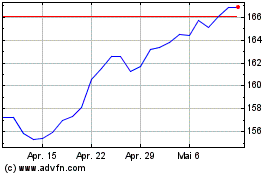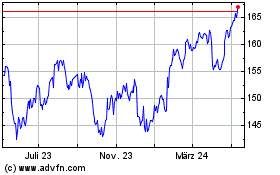Gillette's Ad With a #MeToo Edge Gets Mixed Reactions -- Update
18 Januar 2019 - 12:33AM
Dow Jones News
By Aisha Al-Muslim
Gillette's new ad campaign invoking the #MeToo movement is the
latest test of how big consumer brands can navigate social
movements to appeal to millennials without turning off customers
who either don't agree with their message or don't believe it is
well-executed.
The nearly two-minute ad from Procter & Gamble Co.'s
Gillette tries to tackle sexual harassment, bullying and "toxic
masculinity." "Is this the best a man can get?" the ad released
online Monday asks.
The ad, which plays on the tagline Gillette has used for three
decades, "The Best A Man Can Get," has been viewed about 18 million
times on YouTube. Reaction has been divided: with 901,000 dislikes
on YouTube and 468,000 likes as of Thursday afternoon.
In the first three days of the ad's release, there were more
than 1.6 million mentions of Gillette on Twitter, Facebook and
Instagram, as well as blogs, forums and news sites, according to
data from Brandwatch, a social-media monitoring company. Tuesday
had the most mentions with more than 893,000, above Gillette's
daily average of about 1,300 mentions for the previous 25 days.
The sentiment around the ad started mostly positive on Monday
(62%) and turned more negative by Wednesday (54%), Brandwatch
found. The discussion was split 50/50 between men and women.
Nearly three-fourths of consumers said the brand "is socially
responsible," up from about 55%, according to a survey of 2,200
people conducted Tuesday and Wednesday by Morning Consult.
But the survey also showed how the reaction to the ad fell along
political lines, with most Democrats giving it high marks (73%) and
less than half of Republicans reacting favorably (48%), Morning
Consult found. About 26% of Republicans rated it highly negative,
compared with 8% of Democrats.
Actor James Woods and talk-show host Piers Morgan have lashed
out against Gillette on Twitter over the ad and vowed not to use
their products again. The two were among the most-mentioned Twitter
accounts surrounding the controversy as they received support from
like-minded Twitter users and became the targets of contention from
users who approved of Gillette's ad, Brandwatch found.
"Gillette was trying to make noise, but the ad was disjointed
and it didn't make sense" for male consumers, said Ronn Torossian,
chief executive of 5W Public Relations. "It was including a lot of
messages, and it was all over the place."
In response to criticism, a P&G spokesman said the ad "is
much more than a video -- it is a commitment to spark and
contribute to positive change through our voice as an advertiser
and our actions as a brand and a company." He said P&G has
joined with the Boys & Girls Club of America and will donate $3
million over the next three years toward its programs.
Some Twitter users who were upset about the ad showed photos or
videos of themselves throwing their Gillette razors in trash cans
or tearing them apart, using hashtags like #BoycottGillette and
#GilletteFail. Others have posted photos of their growing beards in
a sign of protest.
"Things like boycotts generally are not long-lasting," Mr.
Torossian said. "This will have very little effect on their bottom
line."
The controversy comes as Gillette, which accounts for more than
half of the U.S. men's razor business, competes for market share
with Edgewell Personal Care Co.'s Schick and upstarts like Harry's,
Unilever N.V.'s Dollar Shave Club and other smaller brands. The
hair-removal category in the U.S., which includes blades and razors
for men and women, is a $4 billion market, according to Nielsen
data.
P&G, one of the world's biggest marketers, is among the
companies that in recent years have used advertising to promote
stances on social issues, such as gender equality, immigration and
gun control. The 181-year-old company has been lauded for its "Like
a Girl" ad campaign for feminine-care brand Always and "Stress
Test" for deodorant brand Secret. Last year, the company won an
Emmy award for "The Talk," which shows African-American parents
discussing racism with their children.
"P&G learned to make their stale brands more present, they
have to take risks," said Michael Priem, founder and CEO of
Minneapolis-based adtech firm Modern Impact.
Nike Inc.'s ad campaign featuring former NFL quarterback Colin
Kaepernick, who had led player protests for racial justice during
pregame national anthem ceremonies, generated both praise and
boycott threats when it made its debut last September.
Nike appeared to weather any backlash from the effort, which was
part of the 30th anniversary of the footwear giant's "Just Do It"
campaign. The company last month reported sales rose 10% in the
latest quarter, driven by growth in both shoes and apparel.
Write to Aisha Al-Muslim at aisha.al-muslim@wsj.com
(END) Dow Jones Newswires
January 17, 2019 18:18 ET (23:18 GMT)
Copyright (c) 2019 Dow Jones & Company, Inc.
Procter and Gamble (NYSE:PG)
Historical Stock Chart
Von Mär 2024 bis Apr 2024

Procter and Gamble (NYSE:PG)
Historical Stock Chart
Von Apr 2023 bis Apr 2024
